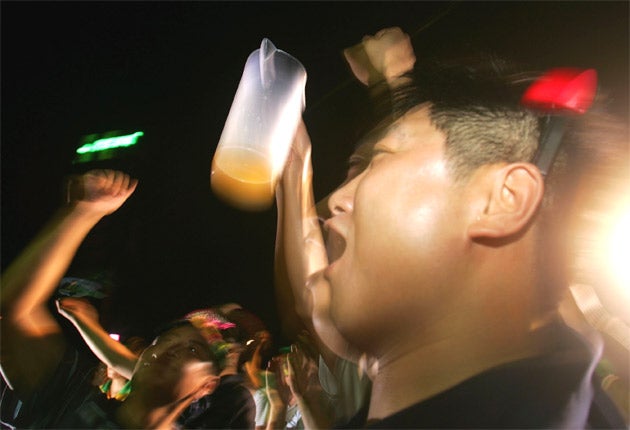Binge-drinking deaths shame China

A senior Chinese police officer who tried to have a subordinate registered as a "martyr" after he was killed by a drinking binge has been suspended by a disciplinary committee.
Captain Xie Feiyong, head of traffic police in the southern city of Shenzhen, wanted his junior, Chen Lusheng, to be given a posthumous award for his dedication to ensure that his family would receive better compensation.
Captain Xie had taken a group of off-duty officers to a banquet with government officials. Mr Chen was sick after a heavy drinking session, passed out on a couch and suffocated on his vomit.
The case has caused further uproar in China about the abuse of privilege by state officials, known as cadres, and their behaviour at official banquets, which are often so extravagant that ordinary people see them as a flagrant form of corruption. A potent spirit called baijiu, distilled from sorghum or rice, is often drunk at such feasts, where the official toast is "gan bei", or "dry glass". Failure to down the burning liquor in one can cause offence. Media reports of Mr Chen's death stoked public indignation by revealing that a bottle of foreign wine costing nearly 6,000 yuan (£540) was among the drinks on offer.
If Mr Chen had been named a "martyr", his family would have been eligible for up to 650,000 yuan (£58,540) in compensation. His relatives are pressuring the government for at least 4.8 million yuan (£430,000), the China Daily newspaper reported.
It is the latest in a series of cases of abuse of power which have scandalised public opinion in the booming south of the country. In October last year, a senior official in Shenzhen was fired after photos and video clips emerged of him apparently trying to molest an 11-year-old girl while drunk. When the girl's father sprung to her defence, the official attacked him and later tried to buy his silence. A month later, a Communist Party official became the third cadre this year to die from heavy drinking after an official banquet in southern China.
The cases highlight the important role ritual drinking plays in business and government. Many Chinese like a drink, particularly beer with food, but are not big drinkers on a day-to-day basis. Many have a physical intolerance to strong drink because they lack the enzymes needed to break down alcohol into acetic acid.
Unlike in Britain and Europe, public drunkenness is extremely rare in China, apart from a few isolated cases on holidays such as the Chinese New Year.
Join our commenting forum
Join thought-provoking conversations, follow other Independent readers and see their replies
Comments
Bookmark popover
Removed from bookmarks